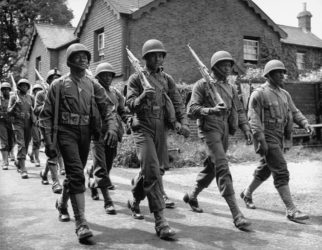 Featured – After Fighting Nazis, Black G.I.s Faced Racism in U.S. Military. By Alexis Clark / NYT
Featured – After Fighting Nazis, Black G.I.s Faced Racism in U.S. Military. By Alexis Clark / NYT
For the 1.2 million black men who served in a segregated army during World War II, efficiency and bravery on the battlefield didn’t lead to the social changes they had hoped for. The gulf between America’s ideals and its realities hit home particularly hard for one group: the thousands of black occupation troops sent to a defeated Germany to promote democracy. The occupation years, 1945 to 1955, would expose a glaring hypocrisy perpetuated by the United States. Black occupation troops were part of the effort to prevent the resurgence of Nazism, yet for years were housed in segregated quarters, barred from officers’ clubs (regardless of their rank) and openly slurred, harassed and physically attacked by white American service members. Read more
 Seeing Black History in Context. By Erin Aury Kaplan / NYT
Seeing Black History in Context. By Erin Aury Kaplan / NYT
Black History Month is traditionally a time to honor black Americans and, theoretically, accord them their proper place in American history. The occasion has always felt too narrow to me. We are eager to celebrate our favorite figures and their trailblazing achievements — Barack Obama is the latest — but less eager to examine the fact that their heroism was based more often than not in fighting an American system that fought — and still fights — against their status as full Americans. Read more
 Bookerism and the Black Elite. By Adolph Reed Jr. / New Republic
Bookerism and the Black Elite. By Adolph Reed Jr. / New Republic
On September 18, 1895, Booker T. Washington gave his famous address to the Atlanta Cotton States and International Exposition. Washington declared before this regional business gathering his acquiescence in the name of the black Southern population to the new regime of almost total black disfranchisement and the abrogation of civil rights within a social, political, and economic order based on explicit racial subordination. The speech offered the architects of the new segregationist order a beguiling metaphor to rationalize their efforts; the races would now work, Washington vowed, “separate as the fingers … one as the hand” in the restlessly improving spirit of free enterprise. Read more
 The Equality That Wasn’t Enough. By Jamelle Bouie / NYT
The Equality That Wasn’t Enough. By Jamelle Bouie / NYT
This month is the 150th anniversary of the ratification of the 15th Amendment to the Constitution. The last of the three Reconstruction amendments, it gave black men the right to vote. It sparked a revolution and a backlash, as racist white politicians used loopholes in the amendment (as well as outright violence) to undermine and eliminate black political power in the 1870s and ’80s. By the end of the 19th century, the 15th Amendment was a dead letter throughout the South. Read more
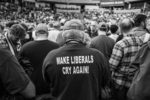 The Audacity of Hate. By Thomas B. Edsall / NYT
The Audacity of Hate. By Thomas B. Edsall / NYT
Campaigns in the past had relied on activating resentment and hostility, of course, but the re-election drive for Bush in 2004 was the first to make this the centerpiece of a mainstream presidential effort. American politics were irrevocably transformed, polarization strategies became institutionalized and the stage was set for the explicit racial and anti-immigrant themes dominating Donald Trump’s campaigns for election and re-election. Read more
 Ta-Nehisi Coates on why political power isn’t enough for the right. By Ezra Klein / Vox Podcast
Ta-Nehisi Coates on why political power isn’t enough for the right. By Ezra Klein / Vox Podcast
This episode of The Ezra Klein Show was a pleasure. Ta-Nehisi Coates joined me in Brooklyn for part of the Why We’re Polarized tour. His description of the book may be my favorite yet. It is, he says, “a cold, atheist book.” We talk about what that means, and from there go into some of the harder questions raised not so much by the book but by American history itself. Then Coates asked me a question I never expected to hear from him: Is there anything I could say to leave him with some hope? Don’t miss this one. A lightly edited excerpt from our discussion follows. You can listen to our whole conversation on The Ezra Klein Show. Listen here
 Black Families Came to Chicago by the Thousands. Why Are They Leaving? By Julie Bosman / NYT
Black Families Came to Chicago by the Thousands. Why Are They Leaving? By Julie Bosman / NYT
The steady exodus of African-Americans has caused alarm and grief in Chicago, the nation’s third largest city, where black people have shaped the history, culture and political life. The population of 2.7 million is still nearly split in thirds among whites, blacks and Latinos, but the balance is shifting. Chicago saw its population decline in 2018, the fourth year in a row. Since 2015, almost 50,000 black residents have left. Read more
 America has been measuring segregation all wrong. But it’s not too late to get it right. By Trevon D. Logan / NBC News
America has been measuring segregation all wrong. But it’s not too late to get it right. By Trevon D. Logan / NBC News
There is a disconnect between how we think about racial segregation and how we measure it. When people think about segregation, they typically think about the people that live next door to them, in close proximity. But social scientistsmeasure residential segregation by first dividing cities into smaller areas, census tracks or city wards, and then analyzing the distribution of minority populations across those areas. The basic idea is to see how black and white people are distributed across neighborhoods. Read more
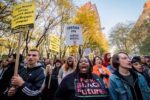 How Democrats can talk about race and win. By Roge Karma / Vox
How Democrats can talk about race and win. By Roge Karma / Vox
Democrats face an uphill battle in 2020: An incumbent president with one of the strongest economies and steadiest Republican approval ratings in decades. An Electoral College map that all but ensures winning the popular vote won’t be enough. What I’m urging is the left to tell a story that says we are working families that have more in common than differences between us, but we are being divided by economic elites who seek profit, division, and conflict. And the way forward is to build social solidarity across lines of division. This is a story of identity more than it is one of ideology or policy. Read more
 Democrats, Don’t Wish for Your Own Rogue. By Charles Blow / NYT
Democrats, Don’t Wish for Your Own Rogue. By Charles Blow / NYT
It is truly a devastating sight to watch liberals who have winced for years at Donald Trump’s issues on wealth, race and women allow fear, propaganda and influence mercenaries to push them into supporting a man who has his own issues concerning wealth, women and race. Read more Also see, The Trumpian Liberalism of Michael Bloomberg
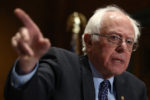 Many Jewish voters are lukewarm on Bernie Sanders — for now. By Sarah M. Seltzer / Vox
Many Jewish voters are lukewarm on Bernie Sanders — for now. By Sarah M. Seltzer / Vox
After his early primary victories, Sen. Bernie Sanders is closer to being America’s first Jewish president than anyone has come in the country’s history. Polling indicates that full-throated Jewish support for Sanders hasn’t yet materialized. In fact, one Pew survey conducted before the Iowa caucuses in mid-January found that Jewish support hadn’t consolidated around any one candidate, despite the historic presence of Sanders and another Jewish contender — Mike Bloomberg — in the race. Read more Also see, Medicare for all would save $450 billion annually while preventing 68,000 death, new study shows
 Meet the Lawyer Who Fought Bloomberg on Stop and Frisk—and Won. By Mary Harris / Slate
Meet the Lawyer Who Fought Bloomberg on Stop and Frisk—and Won. By Mary Harris / Slate
About a week before entering the presidential race, Michael Bloomberg, the billionaire former mayor of New York City, showed up for Sunday services at the Christian Cultural Center in Brooklyn. He offered an apology to the mostly black audience for having supported stop and frisk—the notorious policy that allowed police to question and search New Yorkers, even when they were doing nothing wrong—during his mayoral term. When Darius Charney saw this speech, he was skeptical of Bloomberg’s remorse. Starting in 2008, he and his colleagues at the Center for Constitutional Rights had spent five years suing the city of New York for its use of stop and frisk. They eventually won the case, but Bloomberg fought them bitterly right up until the end of his mayoral term. Read more
 What is the ‘boogaloo?’ How online calls for a violent uprising are hitting the mainstream. By Brandy Zardrozny / NBC News
What is the ‘boogaloo?’ How online calls for a violent uprising are hitting the mainstream. By Brandy Zardrozny / NBC News
An anti-government movement that advocates for a violent uprising targeting liberal political opponents and law enforcement has moved from the fringes of the internet into the mainstream in recent months and surged on social media, according to a group of researchers that tracks hate groups. The movement, which says it wants a second Civil War, is organized around the term “boogaloo.” Read more
 Obama and Trump face off over claims of strong economy. By Veronica Stracqualursi / CNN
Obama and Trump face off over claims of strong economy. By Veronica Stracqualursi / CNN
President Donald Trump is lashing out after former President Barack Obama marked the 11th anniversary on Monday of signing a nearly $800 billion stimulus package designed to reverse the effects of the Great Recession. “Eleven years ago today, near the bottom of the worst recession in generations, I signed the Recovery Act, paving the way for more than a decade of economic growth and the longest streak of job creation in American history,” Obama wrote on Twitter. Hours later, Trump hit back, accusing his predecessor of a “con job” in “trying to take credit for the Economic Boom taking place under the Trump Administration.” Read more Also see, Have Zombies Eaten Bloomberg’s and Buttigieg’s Brains?
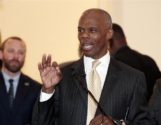 First 24-hour news channel “by and for” African Americans set to launch during Black History Month. By Liam Knox / NBC News
First 24-hour news channel “by and for” African Americans set to launch during Black History Month. By Liam Knox / NBC News
The Black News Channel, the first 24-hour news channel aimed specifically at an African American audience, is set to launch on Feb. 10 to coincide with Black History Month. Founded by former Rep. J.C. Watts, a Republican from Oklahoma, the network will premiere in 33 million households primarily in large African American markets such as New York City, Los Angeles and Atlanta. Read more
 Voters Of Color Are Set To Have A Bigger Say As Democrats Enter A Crucial Phase. By Domenico Montanaro / NPR
Voters Of Color Are Set To Have A Bigger Say As Democrats Enter A Crucial Phase. By Domenico Montanaro / NPR
The candidates have so far stood for elections in two of the whitest states in the country, Iowa and New Hampshire. But Nevada and South Carolina — the next two states to vote — will provide far more diverse electorates. Nevada and South Carolina will be proving grounds for the candidates to demonstrate whether they have broad appeal and, importantly, for whether moderate Democrats coalesce around one candidate who could be an alternative to Bernie Sanders. If not, the Vermont senator will likely continue to have the inside track for the nomination. Read more Also see, Latinos will make their voices heard in Democratic race over the next four weeks And also see, Don’t bet against Joe Biden just yet. He has an ace up his sleeve.
 Some students say colleges not doing enough to combat coronavirus-fueled racism. By Julian Shen-Berro / NBC News
Some students say colleges not doing enough to combat coronavirus-fueled racism. By Julian Shen-Berro / NBC News
A social media post spread through the Barnard College and Columbia University campuses on Manhattan’s Upper West Side, quickly garnering hundreds of comments and shares earlier this month. In it, a Chinese student at Barnard who had self-quarantined herself as a precaution against the coronavirus outbreak was warned by a college official not to leave her dorm room. Read more
 This Puerto Rican Filmmaker Found Her Voice In Trump’s America. By Matthew Jacobs / HuffPost
This Puerto Rican Filmmaker Found Her Voice In Trump’s America. By Matthew Jacobs / HuffPost
With “Marisol” and other short films, Zoé Salicrup Junco is telling Latina stories that need to be heard. Junco believes the prejudice like the kind Marisol faces has an origin point. People biased against a specific culture are conditioned by circumstances, perhaps their upbringing or religion. It’s something she’s realized while living in New York. Even in one of the most progressive cities in the world, her Latinx identity sometimes catches others off-guard. “Marisol” let her explore the social forces that preclude mutual understanding. Read more
 ‘Bad Hair’ And The Black Male Gaze. By Candice Frederick / HuffPost
‘Bad Hair’ And The Black Male Gaze. By Candice Frederick / HuffPost
For the first half of the new horror film “Bad Hair,” writer-director Justin Simien effectively confronts the very real issue of Black hair criminalization. The film follows a young naturalista, Anna (Elle Lorraine), as she struggles to navigate her newly gentrified workplace. However, storytellers need to ask themselves whether they are bolstering a stereotype or moving the conversation forward. Read more
 ‘Miles Davis: Birth of the Cool’: PBS Shares New Trailer, Clip for Doc. By Daniel Kreps / Rollling Stone
‘Miles Davis: Birth of the Cool’: PBS Shares New Trailer, Clip for Doc. By Daniel Kreps / Rollling Stone
More than a year after its debut at the 2019 Sundance Film Festival and a brief theatrical run, the documentary Miles Davis: The Birth of the Cool will debut next week as part of PBS’ American Masters series. PBS has shared the official trailer for the film, which focuses on the life and legacy of the jazz legend. Watch here
 Rube Foster was the big man behind the first successful Negro baseball league. By John Florio and Ouisie Shapiro / The Undefeated
Rube Foster was the big man behind the first successful Negro baseball league. By John Florio and Ouisie Shapiro / The Undefeated
One hundred years ago, on Feb. 13, 1920, Rube Foster — the outsize owner of the Chicago American Giants — walked into the Paseo YMCA in Kansas City, Missouri. Trailing Foster were 11 other men: three sportswriters, Cary B. Lewis of the Chicago Defender, David Wyatt of the Indianapolis Ledger, and Charles Marshall of the Indianapolis Freeman; attorney Elisha Scott; and the owners of seven other black baseball teams. This was Foster’s meeting. He’d arranged it and he led it. On his agenda was one item: Create a Negro baseball league with a national footprint equal to that of the white major leagues, on and off the field. Read more
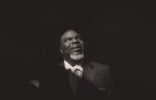 Adding Arts to STEM spells opportunity for students of color. By Curtis Bunn / NBC News
Adding Arts to STEM spells opportunity for students of color. By Curtis Bunn / NBC News
In the course of his ministries, The Potter’s House in Dallas, Bishop T.D. Jakes, has seen how unemployment and low-employment disproportionately affect people of color. To address those concerns, Jakes has spent the last two years developing the T.D. Jakes Foundation, an organization dedicated to teaching minorities traditional STEM subjects (Science, Technology, Engineering and Math) but adding Art, now STEAM, to offer disciplines that will lead to sustainable, high-paying jobs and careers, according to projections by the Institute for Arts Integration & STEAM, a group that helps grade-school teachers with arts-related curriculums. Read more
Visit our home page for more articles, book/podcast and video favorites. And at the top of this page register your email to receive notification of new editions of Race Inquiry Digest. Click here for earlier Digests.
Use the buttons below to share the Digest in an email, or post to your Facebook, Linkedin or Twitter accounts.